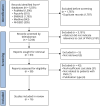Economic Cost of Functional Neurologic Disorders: A Systematic Review
- PMID: 37339887
- PMCID: PMC10351557
- DOI: 10.1212/WNL.0000000000207388
Economic Cost of Functional Neurologic Disorders: A Systematic Review
Abstract
Background and objectives: Functional neurologic disorder (FND) represents genuine involuntary neurologic symptoms and signs including seizures, weakness, and sensory disturbance, which have characteristic clinical features, and represent a problem of voluntary control and perception despite normal basic structure of the nervous system. The historical view of FND as a diagnosis of exclusion can lead to unnecessary health care resource utilization and high direct and indirect economic costs. A systematic review was performed using Preferred Reporting Items for Systematic Reviews and Meta-Analyses guidelines to assess these economic costs and to assess for any cost-effective treatments.
Methods: We searched electronic databases (PubMed, PsycInfo, MEDLINE, EMBASE, and the National Health Service Economic Evaluations Database of the University of York) for original, primary research publications between inception of the databases and April 8, 2022. A hand search of conference abstracts was also conducted. Key search terms included "functional neurologic disorder," "conversion disorder," and "functional seizures." Reviews, case reports, case series, and qualitative studies were excluded. We performed a descriptive and qualitative thematic analysis of the resulting studies.
Results: The search resulted in a total of 3,244 studies. Sixteen studies were included after screening and exclusion of duplicates. These included the following: cost-of-illness (COI) studies that were conducted alongside cohort studies without intervention and those that included a comparator group, for example, another neurologic disorder (n = 4); COI studies that were conducted alongside cohort studies without intervention and those that did not include a comparator group (n = 4); economic evaluations of interventions that were either pre-post cohort studies (n = 6) or randomized controlled trials (n = 2). Of these, 5 studies assessed active interventions, and 3 studies assessed costs before and after a definitive diagnosis of FND. Studies showed an excess annual cost associated with FND (range $4,964-$86,722 2021 US dollars), which consisted of both direct and large indirect costs. Studies showed promise that interventions, including provision of a definitive diagnosis, could reduce this cost (range 9%-90.7%). No cost-effective treatments were identified. Study comparison was limited by study design and location heterogeneity.
Discussion: FND is associated with a significant use of health care resources, resulting in economic costs to both the patient and the taxpayer and intangible losses. Interventions, including accurate diagnosis, seem to offer an avenue toward reducing these costs.
Copyright © 2023 The Author(s). Published by Wolters Kluwer Health, Inc. on behalf of the American Academy of Neurology.
Conflict of interest statement
B. O'Mahony reports no disclosures relevant to the manuscript. G. Nielsen receives research funding from the National Institute for Health and Care Research. S. Baxendale is Chair of the International League Against Epilepsy Diagnostic Methods Commission and is on International Neuropsychological Society Board of Governors. S. Baxendale is a speaker honoraria received from UCB and Neurodiem. M.J. Edwards provides expert evidence and clinical treatment in medicolegal settings. He receives royalties from the Oxford University Press for The Oxford Specialist Handbook of Parkinson Disease and Other Movement Disorders. In the past year, he has received honoraria for education work for Merz Pharma. M. Yogarajah is funded by an MRC CARP award (MR/V037676/1). For the purpose of open access, the corresponding author has applied a Creative Commons Attribution (CC BY) license to any Author Accepted Manuscript version arising. M. Yogarajah conducts independent expert medicolegal work including in relation to FND. Go to
Figures
Similar articles
-
A rapid and systematic review of the clinical effectiveness and cost-effectiveness of topotecan for ovarian cancer.Health Technol Assess. 2001;5(28):1-110. doi: 10.3310/hta5280. Health Technol Assess. 2001. PMID: 11701100
-
Systemic pharmacological treatments for chronic plaque psoriasis: a network meta-analysis.Cochrane Database Syst Rev. 2020 Jan 9;1(1):CD011535. doi: 10.1002/14651858.CD011535.pub3. Cochrane Database Syst Rev. 2020. Update in: Cochrane Database Syst Rev. 2021 Apr 19;4:CD011535. doi: 10.1002/14651858.CD011535.pub4. PMID: 31917873 Free PMC article. Updated.
-
Systemic pharmacological treatments for chronic plaque psoriasis: a network meta-analysis.Cochrane Database Syst Rev. 2021 Apr 19;4(4):CD011535. doi: 10.1002/14651858.CD011535.pub4. Cochrane Database Syst Rev. 2021. Update in: Cochrane Database Syst Rev. 2022 May 23;5:CD011535. doi: 10.1002/14651858.CD011535.pub5. PMID: 33871055 Free PMC article. Updated.
-
The clinical effectiveness and cost-effectiveness of low-intensity psychological interventions for the secondary prevention of relapse after depression: a systematic review.Health Technol Assess. 2012 May;16(28):1-130. doi: 10.3310/hta16280. Health Technol Assess. 2012. PMID: 22642789 Free PMC article.
-
Intravenous magnesium sulphate and sotalol for prevention of atrial fibrillation after coronary artery bypass surgery: a systematic review and economic evaluation.Health Technol Assess. 2008 Jun;12(28):iii-iv, ix-95. doi: 10.3310/hta12280. Health Technol Assess. 2008. PMID: 18547499
Cited by
-
Altered self-processing brain networks in paediatric functional neurological disorder.Neuroimage Clin. 2025 May 28;47:103811. doi: 10.1016/j.nicl.2025.103811. Online ahead of print. Neuroimage Clin. 2025. PMID: 40505251 Free PMC article.
-
Contemporary positive signs of functional limb weakness in post-acute sequelae of SARS-CoV-2: an exploratory analysis of their utility in diagnosis and follow-up.BMJ Neurol Open. 2025 Jun 26;7(1):e000995. doi: 10.1136/bmjno-2024-000995. eCollection 2025. BMJ Neurol Open. 2025. PMID: 40589563 Free PMC article.
-
Functional neurological disorder in Europe: regional differences in education and health policy.Eur J Neurol. 2024 Oct;31(10):e16350. doi: 10.1111/ene.16350. Epub 2024 Aug 15. Eur J Neurol. 2024. PMID: 39145716 Free PMC article.
-
Service use, healthcare costs and productivity losses of functional cognitive disorder in a sample of attenders to out-patient cognitive, neurology and memory clinics.BJPsych Open. 2025 Jul 16;11(4):e152. doi: 10.1192/bjo.2025.10766. BJPsych Open. 2025. PMID: 40667802 Free PMC article.
-
Impact of the COVID-19 Pandemic on the Diagnostic Frequency and Medical Therapies Applied to Subjects With Functional Seizures.Neurohospitalist. 2024 Jul;14(3):253-258. doi: 10.1177/19418744241232011. Epub 2024 Feb 3. Neurohospitalist. 2024. PMID: 38895022 Free PMC article.
References
-
- Feinstein A, Stergiopoulos V, Fine J, Lang A. Psychiatric outcome in patients with a psychogenic movement disorder: a prospective study. Cogn Behav Neurol. 2001;14(3):169-176. - PubMed
Publication types
MeSH terms
Grants and funding
LinkOut - more resources
Full Text Sources
Medical
Miscellaneous

